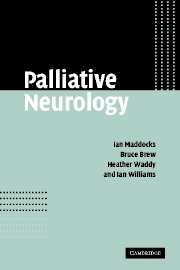Book contents
- Frontmatter
- Contents
- Foreword
- Note on drugs and abbreviations
- Section I Palliative Management
- Section II Major discomforts in advanced neurological illness
- Section III Major neurological conditions requiring palliation
- 1 Cerebrovascular disease: stroke
- 2 Demyelinating disease
- 3 Parkinson's disease and related disorders
- 4 Dementia
- 5 Amyotrophic lateral sclerosis (motor neurone disease)
- 6 Incurable Infections of the nervous system
- 7 Muscular dystrophy
- 8 Neuropathies
- 9 Huntington's disease
- 10 Cerebral neoplasms
- 11 Sequelae of traumatic brain injury
- Section IV Ethical issues
- Section V Appendices
- Index
1 - Cerebrovascular disease: stroke
from Section III - Major neurological conditions requiring palliation
Published online by Cambridge University Press: 08 January 2010
- Frontmatter
- Contents
- Foreword
- Note on drugs and abbreviations
- Section I Palliative Management
- Section II Major discomforts in advanced neurological illness
- Section III Major neurological conditions requiring palliation
- 1 Cerebrovascular disease: stroke
- 2 Demyelinating disease
- 3 Parkinson's disease and related disorders
- 4 Dementia
- 5 Amyotrophic lateral sclerosis (motor neurone disease)
- 6 Incurable Infections of the nervous system
- 7 Muscular dystrophy
- 8 Neuropathies
- 9 Huntington's disease
- 10 Cerebral neoplasms
- 11 Sequelae of traumatic brain injury
- Section IV Ethical issues
- Section V Appendices
- Index
Summary
Stroke is usually a dramatic event; unlike the progressive neurological deterioration of amyotrophic lateral sclerosis (ALS) or Parkinson's disease, and its outcome is difficult to predict. The sudden onset of stroke may call for urgent interventions to reduce progression or extension of brain damage, including administration of aspirin, thrombolytic drugs and blood pressure reduction, plus supportive care – intravenous (I-V) hydration, investigation of cause, prevention of deep vein thrombosis (DVT), early mobilization and appropriate diet. From that acute presentation approximately one third will die within days, one third will achieve a complete or partial recovery, and one third will not improve, and risk further deterioration and eventual death. That last group will be left with severe brain damage, be at risk of severe disability and major discomforts; it is for them that palliative management is most appropriate.
SUPPORTIVE PHASE
The initial symptoms and discomforts common in stroke will be treated expectantly, looking for improvement and encouraging an emphasis on rehabilitation. Where there is further deterioration, emphasis shifts to the maintenance of comfort. There are common difficulties for these patients requiring careful analysis and specific interventions if quality of life is to be satisfactory.
Palliation issues
Bulbar symptoms, swallowing and communication difficulties
Bulbar symptoms may occur through paralysis of motor speech functions, specific damage to cerebral speech areas and connections, or more complex psychological effects with restlessness and anxiety compromising self-awareness and impairing patient descriptions of discomfort.
- Type
- Chapter
- Information
- Palliative Neurology , pp. 127 - 131Publisher: Cambridge University PressPrint publication year: 2005



